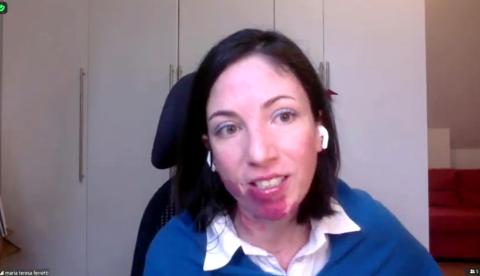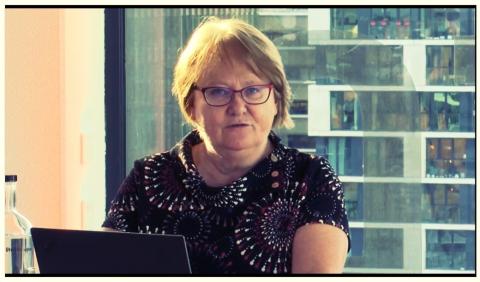The 31st Alzheimer Europe Conference (#31AEC) “Resilience in dementia: Moving beyond the COVID-19 pandemic”, came to a close yesterday evening, 1 December 2021. The focus of the final day of this virtual event was on inclusivity, on dementia as a public health challenge and on new approaches to care and treatment.
Inclusive dementia care: the needs of the LGBTQ+ community

The third and final day of the conference opened with the second of two keynote presentations, which focused on inclusive dementia care and particularly on the needs of the LGBTQ+ community. Patrick Italo Ettenes (He/She) Co-Founder of Bring Dementia Out emphasised the importance of considering some of the real experiences of LGBTQ+ people living with dementia, noting that many organisations are still heteronormative and cis-oriented (cisgender/cissexual/cis describes a person whose gender identity is the same as their sex assigned at birth).
The need to be aware of issues around next of kin for LGBTQ+ people, who are often excluded from care decisions and who face fear of discrimination around their sexual and/or gender identities, was also highlighted. Patrick Ettenes implored representatives of dementia organisations and service providers in attendance at the conference, to ensure they understand how to support LGBTQ+ people living with dementia and provide appropriate information for those who are currently not having their needs met.
Dementia as a public health challenge
The fourth plenary session focused on dementia as a public health challenge. Hana Marie Broulíková, Department of Health Sciences, Vrije Universiteit Amsterdam, and Coordinator of the national dementia strategy at the Czech Ministry of Health opened with a talk on “Keeping dementia as a health priority during the COVID-19 pandemic”. A dementia strategy, she said, is more likely to be pursued when it is incorporated within wider public health policy. The Czech strategy is being implemented as part of a major reform of mental health care. She also stressed that, in order to effectively communicate and accommodate the needs of people with dementia and carers in crisis situations such as the ongoing pandemic, an advisory governmental committee consisting of a wide range of stakeholders is necessary.

Up next, Maria-Teresa Ferretti, Co-founder and Chief Scientific Officer, Women's Brain Project, Switzerland, examined the question of whether we are getting better at taking sex and gender differences into account in Alzheimer’s care. Sex (biological) and gender (socio-cultural) differences in Alzheimer’s disease are particularly relevant in the individual’s diagnostic pathway and medical journey, she noted. For example, she pointed out that of the 12 modifiable risk factors for dementia identified by the Lancet Commission in 2020, several are more common in women, including low level of education and depression. “Considering sex- and gender-specific factors is a key step to improve access to and precision of diagnosis of Alzheimer’s disease”, she stated, noting also that a paradigm shift towards precision neurology would “optimise the diagnostic pathway and the individual’s medical journey.”

In the third presentation, Gill Livingston, Professor at University College London, explored preventable causes of dementia and their public health implications. Worldwide, 40% of dementias may be preventable by addressing 12 risk factors, with half of that risk being accounted for by hearing loss, lower levels of education and smoking, she began. She highlighted that dementia risks cluster in people with fewer socioeconomic resources and in minority ethnic groups and stated that “the potential for prevention is high everywhere and particularly so in more deprived groups and in low and middle-income countries”. Following the morning plenary session, delegates were again given the option to join one of four possible parallel sessions. The first two covered new ways of diagnosing dementia and of recruiting and assessing research participants; and young onset dementia. The third was organised by the bPride and MIRIADE projects and looked at fluid biomarkers as strategic tools for counteracting dementia; while the last one, jointly organised by the European Academy of Neurology (EAN) and the European Alzheimer’s Disease Consortium (EADC), was on “MCI: diagnosis, disclosure and management”.
Lunch time on yoga, brain health and clinical trials
During lunch time, participants were asked to join an online Yoga session. Pamela Strasser from makelifegr8, Luxembourg, led a 30-minute session of Embodied Mindfulness & Movement to help participants relieve the stress and tension caused by hours of sitting in front of a screen. Pamela was joined in the conference studio by some of the conference staff, as well as by some brave delegates participating via Zoom. In the early afternoon, Brain Health Scotland held a Special Symposium bringing together world-leading experts to discuss the most up-to-date knowledge on themes important for maintaining brain health and reducing risk of dementia, with a particular focus on physical activity, sport and nutrition. Simultaneously, TauRx Therapeutics held a Special Symposium on “Late-stage clinical trial conduct during COVID-19: challenges, lessons, and the future for Alzheimer’s disease management”. Following this, the final four parallel sessions of the conferences took place, between 14.15 and 15.30 CET. The first two were on telecare and counselling; and risk factors and prevention. The two other sessions were organised by NEURONET and by the INTERDEM network.
Beyond the pandemic: Reinventing dementia care and treatment

The fifth and final plenary session took the form of a roundtable discussion and the discussion topic was “Beyond the pandemic: Reinventing dementia care and treatment”. Participating in the discussion Craig Ritchie, Director of the Edinburgh Centre for Dementia Prevention and Brain Health Scotland; Lutz Frölich, Head of the Department of Geriatric Psychiatry at the Central Institute for Mental Health in Mannheim and Chair of the European Alzheimer’s Disease Consortium and Marjolein de Vugt, Professor at the Alzheimer Center Limburg, Maastricht UMC+. Panellist Craig Ritchie drew attention to the fact that the COVID pandemic had illustrated continued challenges, with the priority (or lack thereof) given in health and social care systems to people living with dementia. Study set-up and delivery in platform trials realised the value of platform trials, he said, but said that the months and even years we wait for study set-up is completely unacceptable. He also highlighted that the pandemic shed some light on just how potent social isolation can be on cognitive decline and suggested that while digital and remote assessment could be a great complement to face-to-face meetings, they should never be a replacement for them.

During the discussion Lutz Frölich emphasised the need to put the wealth of scientific evidence that has been generated, into clinical practice. Drugs currently in development and undergoing evaluation by the European Medicines Agency target the ‘proteinopathy’ of Alzheimer’s disease, reducing amyloid plaques in the brain. They change the underlying biological process of the disease; however, the diagnostic process is highly complex and not all people who have mild cognitive impairment (MCI) would be eligible, he said. On top of this, the process of proving the presence of amyloid, necessary to be eligible for this type of treatment, is burdensome on both patient and physician. Many things are still unclear including whether the EMA will approve the treatment for European countries at all. Other antibodies are currently in development, one or more of which may be approved in the coming years, he said, which would require some fairly important changes in medical systems. It is imperative that healthcare systems are prepared for this.
Marjolein de Vugt emphasised that a timely diagnosis can create opportunities for psychosocial prevention to improve the well-being of people with dementia and caregivers, while facing the daily social and cognitive challenges of dementia. She also noted that an important future challenge in research is “to make dementia care increasingly precise and fully situated in a specific context at a specific point in time and to improve implementation of innovations in practice”. She pointed out that technological innovations such as e-health can help us advance such personalised approaches in dementia. All plenary sessions at the conference were co-moderated by Jean Georges, Executive Director of Alzheimer Europe and Kim Coppes from Live Online Events.
Goodbye, virtual world. Hello, Bucharest!

During the closing ceremony, the delegates were invited to listen to a rendition of songs by the Irish Forget-Me-Nots Organisation which offers an inclusive community choir for older people and is especially welcoming to people affected by dementia. Norah Walsh, the Musical Director of the Choir gave an update on the history of the choir and how it adapted to the pandemic by connecting and singing via Zoom and becoming a veritable lifeline for choir members. The three-day virtual conference was formally closed by Alzheimer Europe Chairperson Iva Holmerová who thanked speakers and poster presenters for sharing their research, projects and experiences. She also said a special thank you to the various sponsors of the conference: The European Union Health Programme (2014-2020), AbbVie, ADDI the Alzheimer’s Disease Data Initiative, Biogen, Roche and TauRx Therapeutics. All delegates were invited to mark the dates of the next Alzheimer Europe Conference (#32AEC) in their calendars. “Building bridges” will take place in Bucharest, Romania from 5 to 7 December 2022.
Alzheimer Europe would like to thank to all delegates who joined us at #31AEC, and we hope to see you next year for #32AEC! Congratulations, also to the DISTINCT network, which won our top Twitter influencer competition. Alzheimer Europe will bring five of the network’s Early Stage Researchers to next year’s conference and organise a special symposium at its Bucharest conference in 2022, free of charge!
